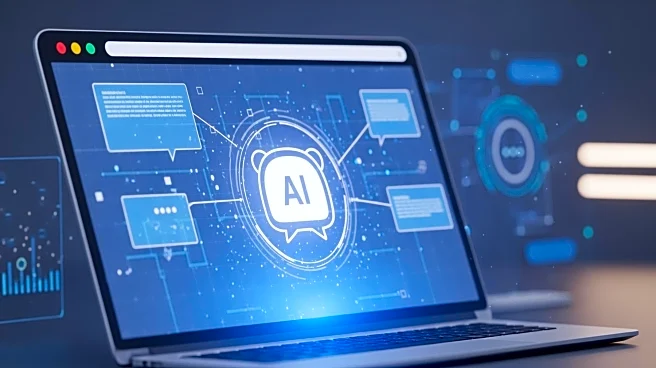What's Happening?
OpenAI has announced the launch of its new AI-powered web browser, ChatGPT Atlas, during a livestream event. The browser is available globally on macOS, with versions for Windows, iOS, and Android expected
soon. ChatGPT Atlas integrates OpenAI's Operator AI agent, allowing users to perform tasks such as booking reservations and filling out forms directly through the browser. The browser also features a ChatGPT interface, enabling direct interaction with the chatbot without needing to visit the ChatGPT website. This development marks OpenAI's entry into the competitive AI browser market, which includes Google's Gemini in Chrome and Microsoft's AI-powered Copilot Mode in Edge.
Why It's Important?
The introduction of ChatGPT Atlas signifies a significant advancement in AI integration within web browsers, potentially transforming how users interact with the internet. By embedding AI capabilities directly into the browser, OpenAI aims to streamline online tasks and enhance user experience. This move could impact the competitive landscape of AI browsers, challenging existing players like Google and Microsoft. Businesses and consumers stand to benefit from increased efficiency and personalization in web browsing, while OpenAI strengthens its position in the AI technology sector.
What's Next?
As ChatGPT Atlas rolls out, OpenAI may face responses from competitors aiming to enhance their own AI browser offerings. The success of ChatGPT Atlas could prompt further innovation in AI-driven web technologies, potentially leading to new features and capabilities. Stakeholders, including tech companies and users, will likely monitor the browser's performance and adoption rates closely. OpenAI's strategic partnership with Microsoft may also influence future developments in AI browser technology.
Beyond the Headlines
The launch of ChatGPT Atlas raises questions about privacy and data security, as AI browsers handle sensitive user information. Ethical considerations regarding AI's role in decision-making and automation may also emerge. Long-term, the integration of AI into everyday browsing could shift cultural norms around internet use and digital interaction.










